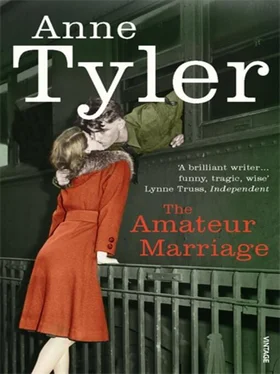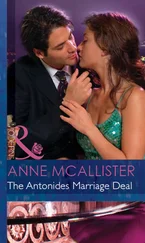Then he was close enough so they could make out his broad grin, which stretched his face to a diamond shape and reminded them of the rambunctious kid he had been back in grade school. And his mother gave a sound that seemed wrenched from her chest, and set off at a hobbling run to meet him.
Long, long afterward, reminiscing together about how oddly exhilarating those hard, sad war years had been, more than one of the women privately summoned the picture of Michael Anton and his mother hugging on the sidewalk while Pauline watched, smiling, tipping slightly backward against the weight of his bag.
He said he was in no pain at all, except for when it rained. Then he might get a twinge in his hip joint. For he had been shot in the hip, not the back. In the rear end, to put it plainly. (“Back” had been a politeness.) Out in the woods on maneuvers, clambering over a log, he had felt a kind of slamming sensation and a deep, flaring ache, and next thing he knew he was lying facedown on a pile of moldering leaves. Lucky he’d been mounting that log or he would have been shot in the back, possibly straight through the heart. And yes, he could say who had done it: that fellow with the constant cough who’d bunked next to him in Virginia. Wouldn’t you just know that of all the men he’d trained with, that was the one they would ship west with him? The guy’s rifle had gone off when he stumbled — an accident, but one that never should have happened in view of the safety measures drilled into them from the start. Still, look at it this way: that fellow was a whole lot worse off now than Michael. He was still in the Army.
It was Thursday afternoon, and Michael, wearing gray work trousers and a blue plaid cotton shirt washed nearly translucent, was shelving pinto beans as he spoke. Mrs. Brunek, Miss Jakubek, and Mrs. Serge stood at the counter, each ostentatiously displaying a grocery list, but they weren’t fooling a soul. People had been coming in all day on the flimsiest of excuses, just wanting to wish Michael well and hear what he had to say for himself.
He said it would take him a while to catch on to this ration-point business. So complicated! So many forms! And there were other things to get used to. The skylight in Penn Station, he said, had been painted over completely, that pretty compass-rose sort of glass made opaque in case of air raids. Did they know that? No, they did not. They didn’t have much reason to ride the train these days.
And it was such a surprise, he went on, to see the blackout shades in everybody’s windows. Why, things were no different here than out west! Evidently he had expected that home would be exempt somehow — that the war was only elsewhere.
Well, just look at Davey Witt. Davey refused to sleep in a room alone now. Lord only knew what those poor boys had been through, so far away from Baltimore.
Mrs. Anton punched the keys of the sculptured brass cash register and the drawer slid open with its musical chin-chink! She was wearing her normal clothes again, but her manner was livelier than the three women had seen in ages, and when she told them “Come back soon!” she was very nearly singing.
Halfway out the door, the women caught sight of Pauline. She was flying toward them in a drift of pink-flowered white muslin, holding onto her straw hat so it wouldn’t blow away in the breeze she’d set up. Interesting how she’d changed her colors just at the very time when she was changing in people’s opinions. From dangerous and dramatic red to gentle, soft pastels, she’d gone. Probably that was due to the season, but still, they did like her so much! She was just what Michael needed, someone to warm up his life. Notice how she greeted all the women by name. “Hello, Mrs. Brunek! Hi, Miss Jakubek! Hi, Mrs. Serge!” And how at home she seemed, darting past them into the grocery store, trilling her fingers at Michael’s mother and tossing Michael a dimpled smile that turned him sweetly self-conscious. For of course the women followed her back inside. It would be a shame to miss this!
She said, “Guess what, Michael.”
“What,” he said, beaming. He reached for the cane that he’d hooked on the edge of the counter.
“Guess!”
“Well, I don’t know, Polly.”
“Reverend Dane said we can be married in his church.”
“He did? Really? That’s great!” Michael said.
Pegging the length of the counter so that he could come out and join her, he flicked a glance toward his mother in passing. The neighbor women checked too. How would she take the news? Her son getting married in a Protestant church: not what most mothers would hope for.
Mrs. Anton was stalwart. She raised her chin and said, “Isn’t that nice!”
“Naturally you’re all invited,” Pauline told the women.
They looked at each other and murmured their thanks. (Father Pasko would throw a fit.)
“Also, guess what, Michael,” Pauline said.
He was standing in front of her now, leaning stiff-armed on his cane and smiling down at her. He said, “What.”
“Guess!”
Michael was so slow and stodgy; the women had never realized how stodgy. “ What, Polly,” he said.
“My father’s going to find an apartment for us.”
Michael blinked. He said, “Why would we need an apartment?”
“To live in, silly!”
“But we have a place to live in. Here above the store.”
“Yes, but Dad says he can find us something of our own. Lots of times he hears first when people are getting evicted, he says, when they come to him looking for someplace cheap in a hurry. All he has to ask them is, ‘Where was it you’ve been living till now?’ and if their landlord hasn’t—”
“But we can’t afford our own place, hon. I already told you. Mama’s going to move out of her bedroom and you can decorate it yourself, any way you like.”
Mrs. Anton was giving up her bedroom? So she’d have to sleep in that sliver of a room that used to be Michael and Danny’s. (It wasn’t very hard to figure this out, with houses all more or less the same floor plan.) What a sacrifice! The women sent Mrs. Anton a look, but she didn’t respond. She was watching Michael and Pauline.
Pauline said, “Oh.”
Michael said, “You understand.”
“Well,” she said.
She took a step backward. She was wearing flimsy sandals in an impossibly narrow size, something none of the hefty neighborhood girls could have dreamed of fitting into, and even on this creaky floor her step was so light and dainty that she didn’t make a sound. She spun around, and just like that she was gone. The screen door swung shut. The rusty spring on top vibrated twangily.
Michael turned to the women with such a perplexed expression that Mrs. Brunek, for one, seemed to feel the need to explain. She gave a tinkle of a laugh and said, “Oh, you know: bridal jitters!”
He said, “Maybe I should go talk to her.”
He left, his rubber-tipped cane chirping in an anxious-sounding way.
Miss Jakubek was so distracted that she started shopping all over again, even though she was already carrying a little parcel of canned goods.
Sometimes it seemed that the war was blurring St. Cassian’s edges. The factory girls were dating fellows from South Carolina and West Virginia; the boys overseas were writing home about girls with English accents. A number of the neighborhood women — respectable women, married, with children — had taken jobs at Glenn L. Martin. They set off for work each morning in coarse blue denim coveralls while their mothers, wearing scarves knotted under their chins and dresses shaped like potato sacks tied in the middle, watched after them and shook their heads. Who knew where it would end?
You didn’t hear just polkas anymore; you heard “Chattanooga Choo Choo” and “The White Cliffs of Dover” and “I’ve Got a Gal in Kalamazoo.” You heard “Blues in the Night” and “Take Me” and “I Don’t Want to Walk Without You.” Young people danced cheek to cheek, so slowly they might be sleepwalking. Katie Vilna got pregnant. Jerry Kowalski’s girlfriend ran off with a sailor from Memphis. Everyone in the neighborhood learned how to identify airplanes.
Читать дальше












